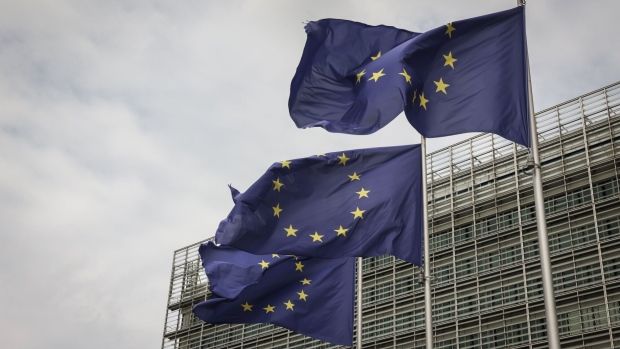Apr 10, 2024
EU Clears Way for New Immigration Rules Ahead of June Elections
, Bloomberg News

(Bloomberg) -- The European Union cleared a major hurdle toward adoption of a key migration and asylum policy criticized by some human-rights activists and lawmakers for potentially aggravating existing problems.
After a heated debate, the European Parliament on Wednesday voted to support a common system to manage arrivals to the bloc that would speed up asylum, return and border procedures while ensuring shared responsibility among member states to aid those experiencing a critical inflow of migrants. The EU will also establish uniform rules to identify non-EU nationals on arrival.
“The pact strikes the right balance between stricter rule against the abuse of the system and care for the most vulnerable,” European Commission President Ursula von der Leyen said at a news conference.
The vote follows a political agreement between the lawmakers and EU member states on the new pact that aimed to address existing drawbacks which have fed support for migrant-averse right-wing parties ahead of European-wide elections in June. Migration is a hot issue in Europe where countries like Greece, Spain and Italy have been overwhelmed with crossings from third-country nationals, particularly from the Middle East and Africa fleeing violence and poverty.
German Chancellor Olaf Scholz praised the result as an important step for Europe’s solidarity.
“It limits irregular migration and finally relieves the burden on those countries that are particularly hard hit,” Scholz said in a post on X.
The landmark pact still needs to be formally approved by EU member states before it takes effect. The regulations are expected to start applying in two years time.
The EU’s approval of the package is the culmination of a decade of difficult negotiations between the bloc’s 27 member states and with the parliament.
Under the new rules, all irregular migrants will be registered and subject to identity, security, and health screenings. Processing asylum applications will take less time and prevent subsequent applications. A member state that is facing a crisis may request solidarity measures from other EU countries, including relocating asylum seekers to other members and receiving financial contributions.
“Building a fortress Europe by throwing up fences, paying off warlords and normalizing inhumane practices will not stop migration,” Philippe Lamberts, president of the Greens/European Free Alliance group in the European Parliament, said before the vote. “The pact will entrench existing problems by disproportionately focusing on deterrence, including through the widespread detention of people and children, while reducing their rights.”
Ahead of the vote, over 50 civil society organizations said the new rules will translate into de facto detention at borders with no exemption for families with children of all ages, as well as accelerated, substandard procedures to assess asylum claims.
Oxfam, an international aid group, afterwards called it a “massive step backwards.”
“This pact does nothing to fix the chronic flaws of the EU asylum system; instead, it sets the stage for more human suffering,” Stephanie Pope, Oxfam’s EU migration expert, said in a statement.
The EU registered about 380,000 irregular border crossings last year and more than 1 million applications for asylum, most from Syria, according to the EU Agency for Asylum. More than 90% of irregular migrants arrive in the EU through smugglers.
(Updates with comments from von der Leyen, Scholz starting in 3rd paragraph)
©2024 Bloomberg L.P.







